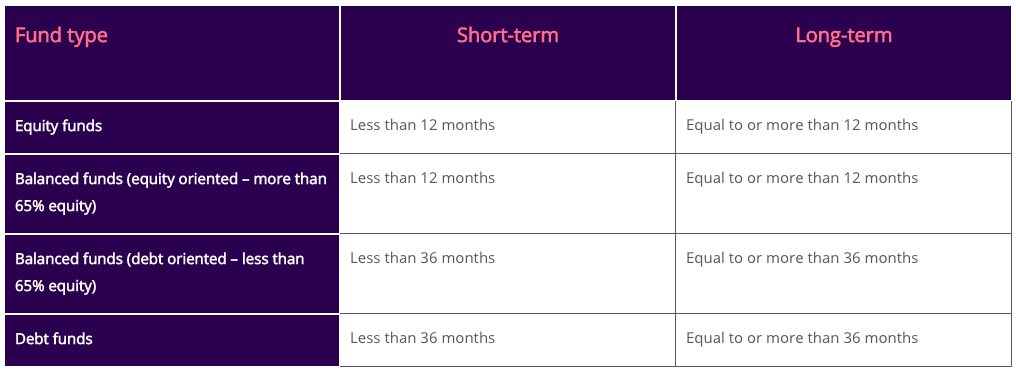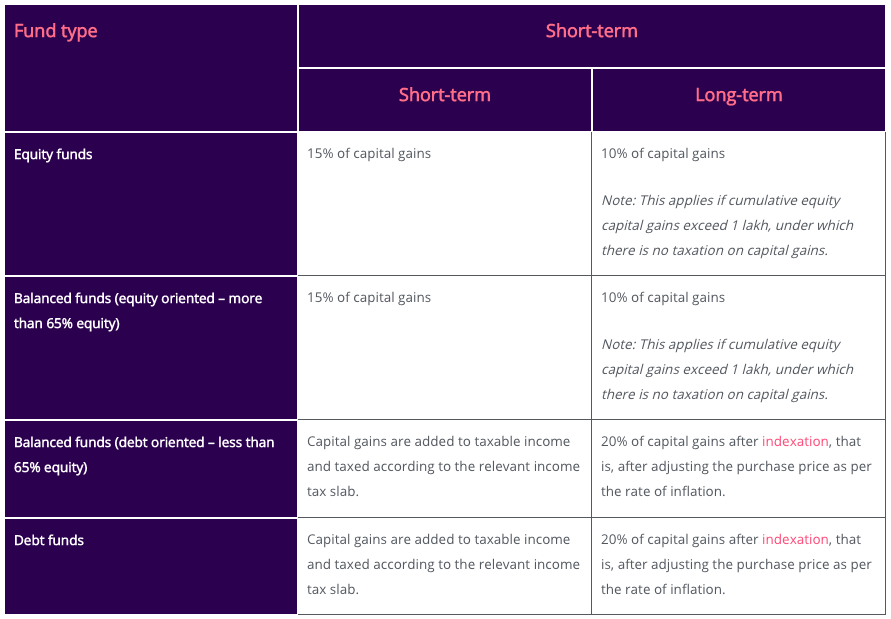Did you know that you can be taxed on your mutual funds investments under capital gains taxes? These taxes can significantly impact your returns. Fret not, like every problem, this too has a solution. But before we explore strategies to minimise them, it is important to understand what capital gains mean.
What are capital gains?
Capital gains refer to the increase in an asset’s value that is realised once the asset is sold at a higher value than its purchase price. Hence, as long as the selling price of the asset is higher than it’s buying price, it is considered capital gains.
Capital gains are classified based on the holding period of the asset. There are two kinds of capital gains – short term and long term.

Types of capital gains
- Short-term capital gains: If the asset is held for a short period of time, typically less than 36 months (or 12 months), it is considered short-term capital gains.
- Long-term capital gains: If the asset is held for a longer period of time, typically more than 36 months (or 12 months), it is considered long-term capital gains.
This classification varies based on different types of asset classes such as equity and bond. For mutual funds, this boils down to the composition of the fund in terms of the underlying assets.

Fund type
Short-term
Long-term
Equity funds
Less than 12 months
Equal to or more than 12 months
Balanced funds (equity oriented – more than 65% equity)
Less than 12 months
Equal to or more than 12 months
Balanced funds (debt oriented – less than 65% equity)
Less than 36 months
Equal to or more than 36 months
Debt funds
Less than 36 months
Equal to or more than 36 months
Taxation of mutual fund capital gains
The capital gains on your mutual fund investments are taxed, impacting your overall returns by upto 1-2%. While it seems like a small percentage, the overall impact can be quite significant. For instance, let’s say you have an equity fund investment worth Rs 10,00,000, which provides a 12% return over 10 months. The short-term capital gains taxes upon surrender of the investment will be 15% of the capital gains, which equals Rs 18,000 in this case.
Mutual funds are taxed differently based on the type of fund and holding period, as outlined in the table below.

Fund type
Short-term
Short-term
Long-term
Equity funds
15% of capital gains
10% of capital gains
Note: This applies if cumulative equity capital gains exceed 1 lakh, under which there is no taxation on capital gains.
Balanced funds (equity oriented – more than 65% equity)
15% of capital gains
10% of capital gains
Note: This applies if cumulative equity capital gains exceed 1 lakh, under which there is no taxation on capital gains.
Balanced funds (debt oriented – less than 65% equity)
Capital gains are added to taxable income and taxed according to the relevant income tax slab.
20% of capital gains after indexation, that is, after adjusting the purchase price as per the rate of inflation.
Debt funds
Capital gains are added to taxable income and taxed according to the relevant income tax slab.
20% of capital gains after indexation, that is, after adjusting the purchase price as per the rate of inflation.
For systematic investment plans (SIPs), the tax treatment of each periodic investment is handled independently, based on the holding period for the individual investment. For instance, for a 3-year SIP being surrendered at the end of 3 years, the installments over the first two years will be classified under long-term capital gains and the third year installments will be classified under short-term capital gains.
Is there a way to reduce capital gains taxes?
Capital gains taxes can be reduced through a process called tax loss harvesting, which involves temporarily selling off certain assets within the portfolio at a loss to offset some of the capital gains in a given fiscal year. We will delve deeper into this topic in our blog within the coming few weeks.

Bottom Line
As illustrated, capital gains taxes on mutual funds often have very tangible impacts on the returns of your investments. It is important to be cognizant of these impacts, especially while cashing out. Strategic moves such as tax loss harvesting or holding your assets for longer term to leverage the relatively lower tax treatment of long-term capital gains as compared to short-term gains can help you save on your taxes.